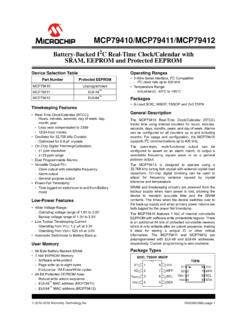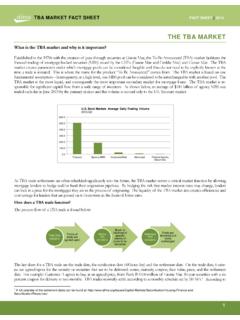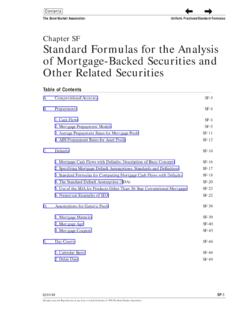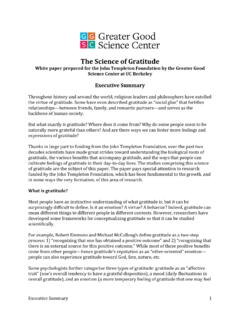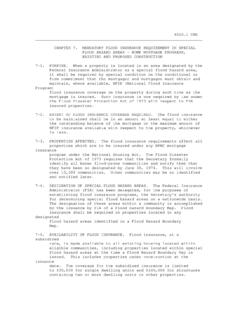Transcription of The Efficacy and Effectiveness of Psychological Treatments ...
1 The Efficacy and Effectiveness of Psychological TreatmentsDr. John Hunsley Katherine Elliott Zo TherrienUniversity of OttawaSeptember 10, 2013 Canadian Psychological Association141 Laurier Avenue West, Suite 702 Ottawa, Ontario K1P 5J3 ISBN # 978-1-926793-09-2 October 2013 This report was prepared by Dr. John Hunsley, Ms. Katherine Elliot and Ms. Zo Therrien, School of Psychology, University of Ottawa. Preparation of this report was commissioned by the Canadian Psychological CANADIAN PSYCHOLOGY ASSOCIATION Executive SummaryThere is extensive evidence demonstrating that psychotherapy can be an efficacious and effective healthcare service for a wide range of commonly experienced mental health and health conditions. This conclu-sion applies across the lifespan and is based on many hundreds of studies, including both randomizedcontrolled trials and studies examining the impact of evidence-based Psychological Treatments deliveredin typical clinical works for the treatment of depression.
2 Contrary to popular belief, it works at least as well(if not better) for patients with severe symptoms as it does for those experiencing milder forms of depres-sion. Psychotherapy is as effective as medication in treating depression and is more effective than med-ication in preventing relapse. For some patients, the combination of psychotherapy and medication willbe more beneficial than either treatment on its to the use of medication alone for the treatment of bipolar disorder, combining psychotherapywith medication leads to patients functioning better and having fewer relapses. Emerging evidence sug-gests that adding psychotherapy to medication results in better treatment adherence, reduced subjectiveburden of disease, and lower suicide rates. In the treatment of anxiety and related disorders, there is strong evidence to support the use of psychother-apy as a first line treatment.
3 This holds across the lifespan for generalized anxiety disorder, social anxietydisorder, specific phobia, panic disorder, obsessive-compulsive disorder, and posttraumatic stress disor-der. Although the strength of evidence varies considerably across the treatment of anxiety and related disor-ders, in general, psychotherapy and medication appear to be equally effective. For many of these disordersthe rates of premature termination of treatment are lower for psychotherapy than for pharmacotherapy. Overall, for depression, anxiety disorders, and related disorders, the strength of psychotherapeutic effectsis similar or superior to what is typically found with the pharmacological treatment of these disorders. Inlight of this pattern of results and the potential for negative side-effects associated with medication, manyclinical practice guidelines encourage clinicians to consider psychotherapy as the first treatment optionto offer to patients with these reduces depression and anxiety in people with coronary heart disease (CHD) an importantfinding given the Psychological burden associated with these symptoms and the fact that depression hasbeen shown to a risk factor for CHD.
4 There is also some evidence that, when added to usual medical treat-ments for patients with CHD, psychotherapy significantly reduces cardiac-related can be more efficacious in reducing smoking (another CHD risk factor) than the usual med-ical treatment of CHD. 3 The Efficacy and Effectiveness of Psychological TreatmentsThe Efficacy and Effectiveness of Psychological TreatmentsBased on the results of the extensive research on the effects of Psychological Treatments , the Amer-ican Psychological Association (APA) recently passed a resolution recognizing the substantial clinical im-pact of psychotherapy (APA, 2013). Although a global statement about the positive effect of psychotherapydoes reflect the general research findings, it provides little guidance on the important nuances that aboundin the Psychological treatment literature. Psychotherapies have been developed to address a broad rangeof mental health and health conditions, which makes an awareness of these nuances key to understandingthe strength of research findings pertinent to a specific disorder or condition.
5 Such information is essentialfor clinicians delivering Psychological Treatments , for those developing policies on first line treatment op-tions, and, of course, for those seeking are numerous sources that provide this type of disorder-specific information, includingscholarly texts ( , Nathan & Gorman, 2007; Weisz & Kazdin, 2010), clinical practice guidelines ( ,National Institute for Health and Care Excellence, ), and practice reviews pro-duced by professional associations and organizations ( , Australian Psychological Society, 2010). Forexample, the Australian Psychological Society (2010) has produced a systematic review of the researchliterature focused on the Efficacy of Psychological interventions for the most commonly encountered men-tal disorders, including mood disorders, anxiety disorders, substance use disorders, eating disorders, ad-justment disorder, sleep disorders, sexual disorders, somatoform disorders, personality disorders,psychotic disorders, dissociative disorders, and disorders first evident in childhood.
6 This extensive docu-ment is a testament to the research supporting the Psychological treatment options available for addressingmental health purpose of the current review is to illustrate the extensive evidence that supports the efficacyand Effectiveness of psychotherapy for many common mental health and health conditions. In order tobest represent the scope and strength of the research evidence, our review is selective rather than exhaus-tive. Readers interested in the treatment of conditions not addressed in our review are encouraged to referto the excellent and thorough sources mentioned above. A wide range of psychotherapies is included inour review, including cognitive behavioural therapy (CBT), interpersonal psychotherapy (IPT), and short-term psychodynamic therapy. By focusing on the Psychological treatment, across the lifespan, of mooddisorders, anxiety disorders, and coronary heart disease, our intent is to demonstrate the substantial effectsthat such Treatments can have on some of the most common and most debilitating health conditions facedby Canadians.
7 Because summaries of the evidence for the cost- Effectiveness of psychotherapy for manyconditions are available in the scientific literature ( , Chiles, Lambert, & Hatch, 1999; Hunsley, 2003),we do not provide detailed information on this aspect of the impact of psychotherapy. We do, however,mention costing data when relevant examples are available that add to what is commonly known aboutcost considerations. Psychological Treatment Research In recent years, an important distinction has been made with respect to research focused on theoutcome of psychotherapy. This distinction between Efficacy research and Effectiveness researchis central4 THE CANADIAN PSYCHOLOGY ASSOCIATIONto attempts to transport successful Treatments to routine clinical practice (cf. Hunsley & Lee, 2007). Asdescribed by Hunsley (2007):Treatment Efficacy studies involve methodological efforts to maximize the internal valid-ity of a study.
8 This commonly includes the use of design features, such as random assign-ment to treatment and control conditions, training of therapists to a specified level ofcompetence in providing the treatment, and ensuring that all participants have the con-dition that the treatment was designed to address. Treatment Effectiveness studies, onthe other hand, strive to maximize external validity while maintaining an adequate levelof internal validity (without which, of course, no viable conclusions could be drawn aboutthe impact of the treatment). Most commonly, efforts to enhance external validity involvelocating the treatment study within clinical service sites that provide ongoing healthservices, thus using clinicians who are routinely providing Psychological services and pa-tients who have been referred to the clinical settings ( ).Data from both Efficacy and Effectiveness studies are key to a full understanding of the potentialimpact of a treatment.
9 Once a treatment has been shown to be efficacious through multiple replications,the next step is to determine how well the treatment works in typical clinical practice (Rounsaville, Carroll,& Onken, 2001). Evidence demonstrating that Treatments evaluated under highly controlled research con-ditions ( , Efficacy studies) can have a comparable clinical impact when delivered in regular clinical set-tings ( , Effectiveness studies) provides essential support for the routine clinical use of such this reason, the focus in this review is on both Efficacy and Effectiveness research. Our strategy for summarizing the relevant research literature involved, primarily, a reliance onthe results of published meta-analyses. This emphasis on quantitative literature reviews is commonly em-ployed in the development of clinical practice guidelines and is seen as providing the best foundation forevaluating treatment effects.
10 Meta-analyses are likely to provide the most current and thorough overviewof a research area, and the use of state-of-the-science statistical techniques ( , weighted least squaresanalyses, random effects modelling) ensures the most accurate synthesis of results obtained from multiplestudies. For many of the disorders addressed in this document, several meta-analyses have been publishedin the past two decades. Therefore, whenever more than one relevant meta-analysis was available, wechose to include the most comprehensive meta-analyses. In almost all instances, this means that we arepresenting information from the most recently published meta-analyses including, whenever possible,meta-analyses comparing outcomes associated with Psychological Treatments and with pharmacologicalinterventions. In some cases though, especially with Effectiveness research, the state of the research liter-ature is not sufficiently developed to warrant a meta-analytic review.



